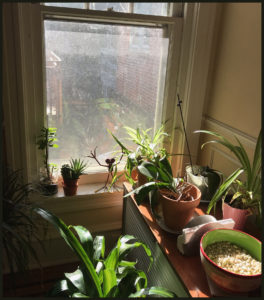 We’ve all had the experience of eating while trying to do other things. We sit down (or not) to a meal, and meanwhile are checking our phones, looking at a to-do list, thinking about a problem…
We’ve all had the experience of eating while trying to do other things. We sit down (or not) to a meal, and meanwhile are checking our phones, looking at a to-do list, thinking about a problem…
This morning I had to actively and multiple times remind myself that I really wanted to just enjoy my oatmeal, and give my body the sense that today would be peaceful and unhurried. I had to gently remove my hands from several other things that were interesting to me— my notebook, a little pile of things to tidy on the table, the computer over in the corner— and finally turn to face the window full of plants so I could settle.
Like a record skipping over some essential piece of the song, my mind jumped from the spoonful in my mouth to projects, ideas and plans, and then I’d return— to the rich taste of coconut milk, or to rolling a tiny morsel of steel cut oat between my teeth and tongue. As I landed more and more, things started to change. My stomach gurgled. My belly softened. My breathing became more alive with little sighs, rolling inhales, and timeless exhales. For a few easy, open minutes, my mind rested.
The digestive tract, now understood scientifically as home to the Enteric Nervous System or “Gut Brain,” is lined with neurons that produce serotonin and communicate to the brain, helping to regulate sleep, rest, mood, and digestion. Tuning in to the sensory experience of our gut and supporting what it needs can facilitate significant shifts in our mental, emotional, and physical states of being.
As I slowed down to feel my tongue and teeth and their relationship with my gut, a whole realm of support opened up for me that became a really nice foundation for my day.
How do I transition to my tasks today while letting my gut and mind rest?, I wondered, and this response came:
Linger for a minute, then water the plants.
A perfect transition.
Thanks gut-brain, and whole, miraculous body-mind.


